Unit 6 When was it invented-Section A 3a-3c 课件(共70张PPT)
文档属性
| 名称 | Unit 6 When was it invented-Section A 3a-3c 课件(共70张PPT) | 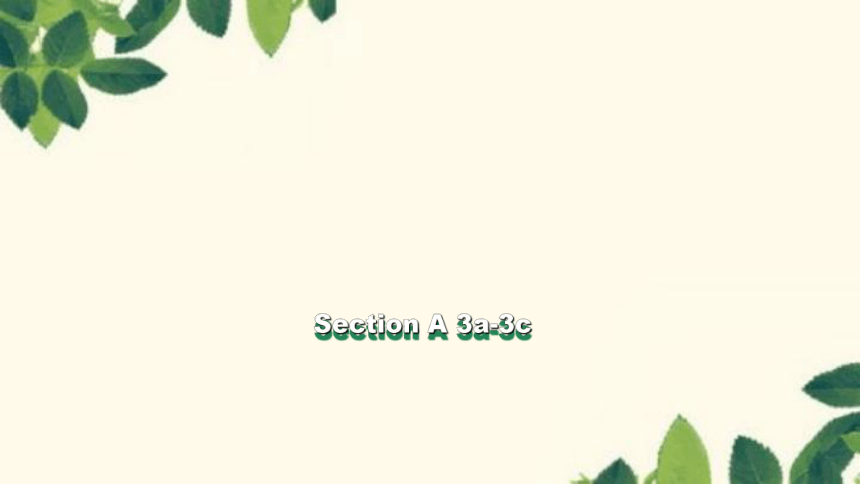 | |
| 格式 | ppt | ||
| 文件大小 | 3.2MB | ||
| 资源类型 | 教案 | ||
| 版本资源 | 人教新目标(Go for it)版 | ||
| 科目 | 英语 | ||
| 更新时间 | 2022-09-21 10:44:14 | ||
图片预览

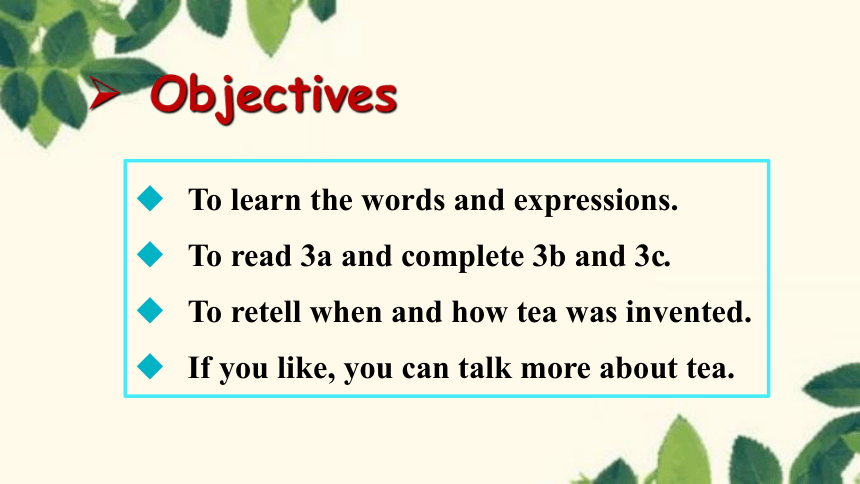
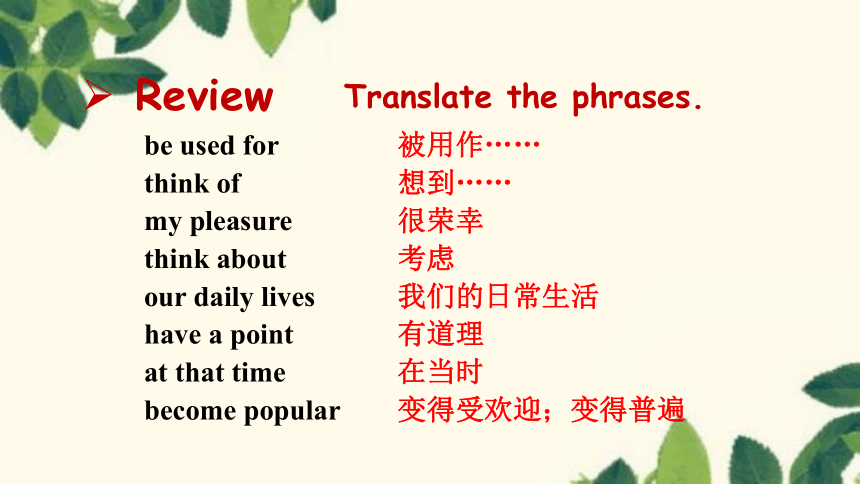
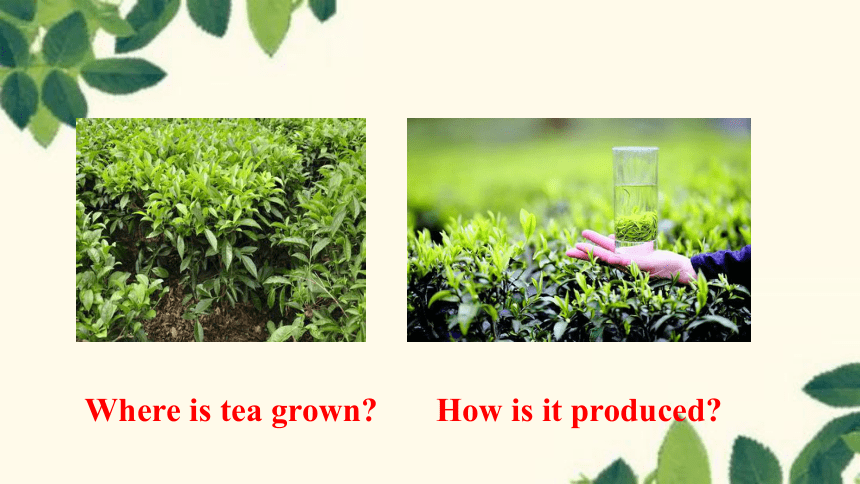
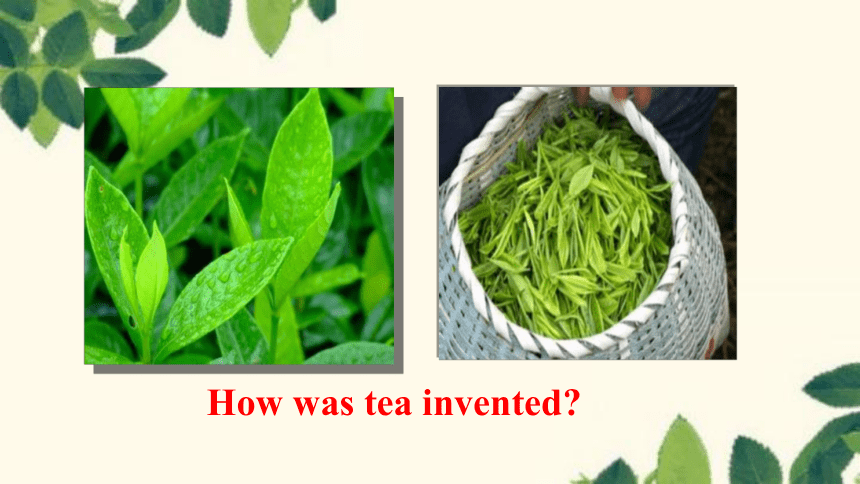
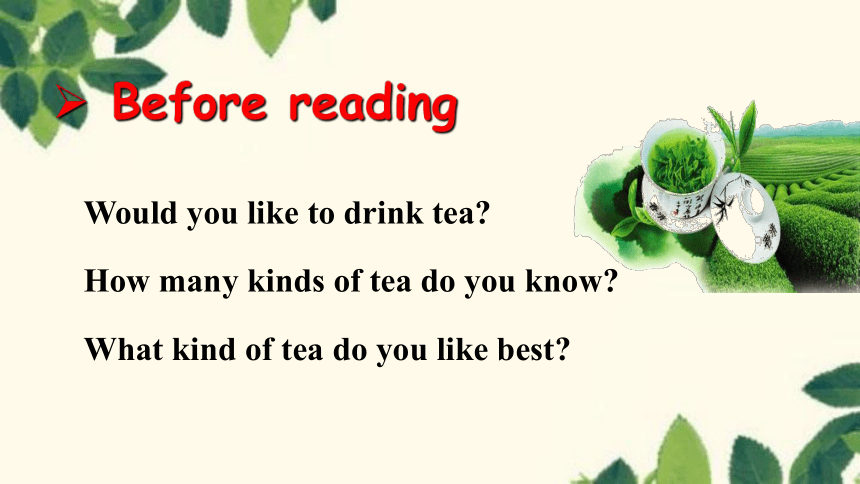
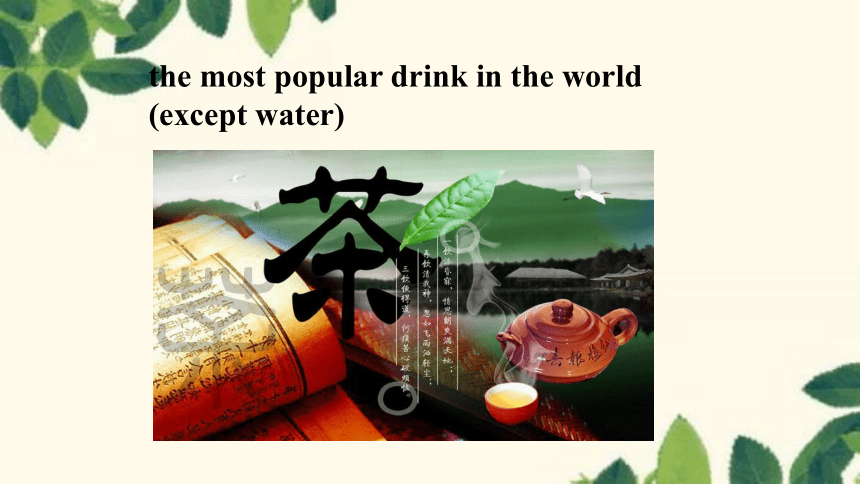
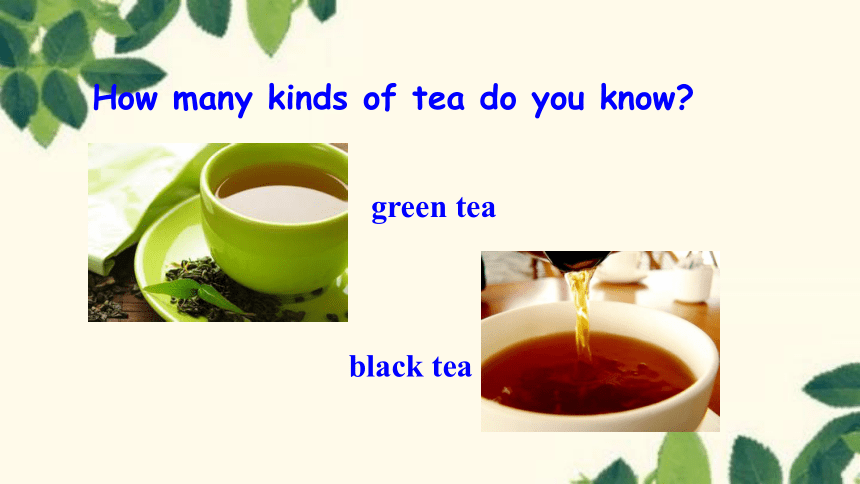
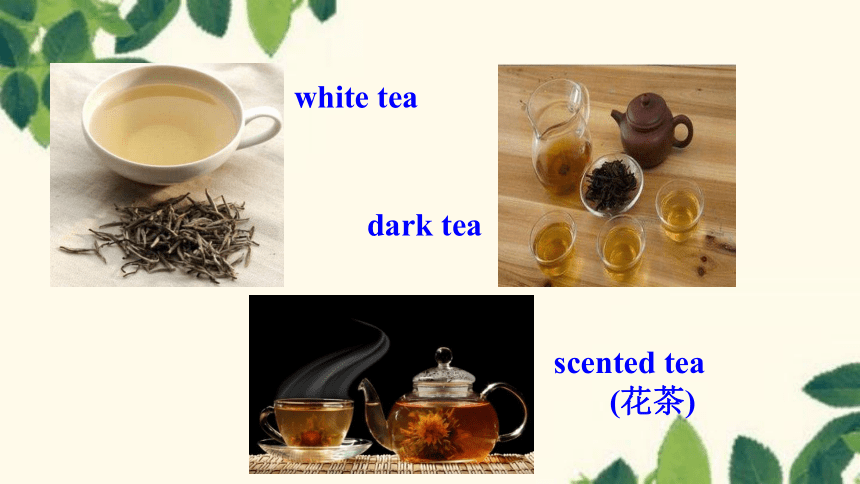
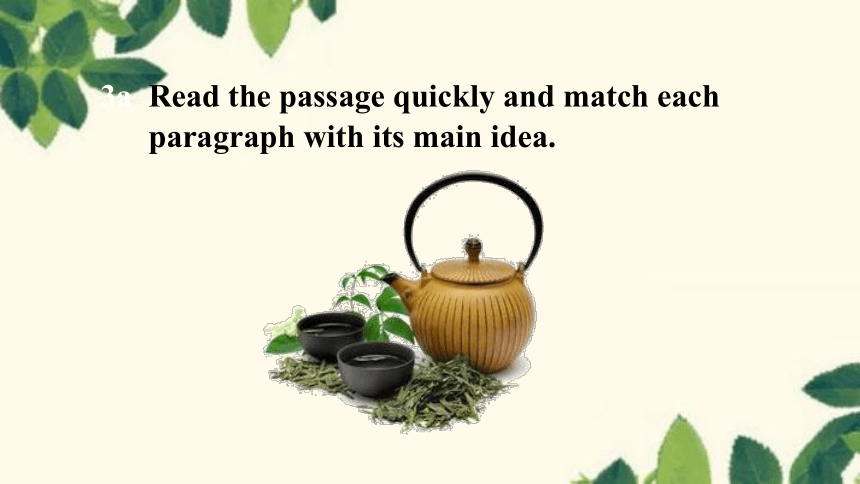
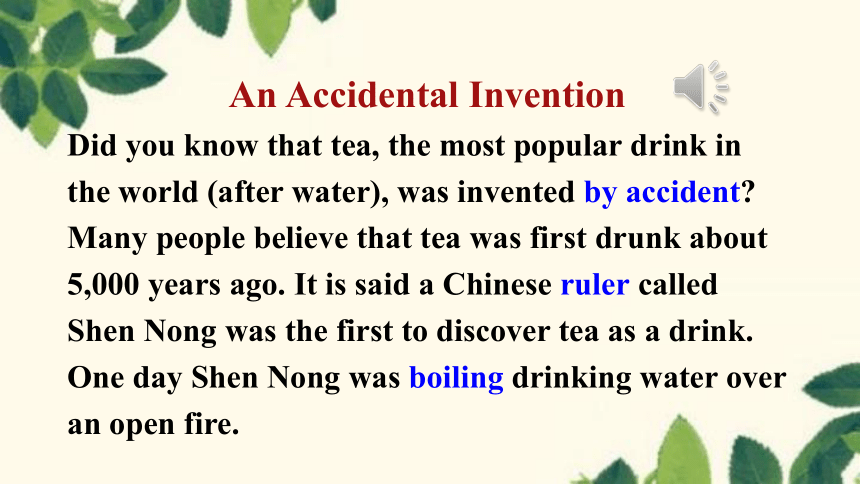
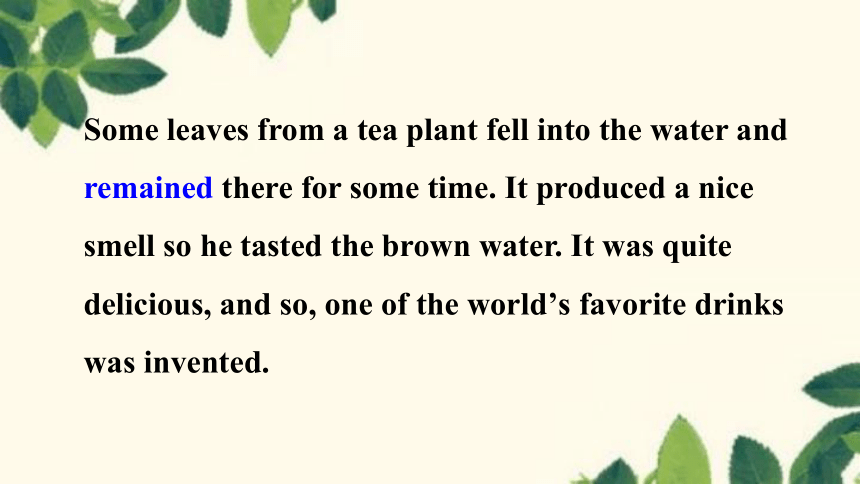
文档简介
(共70张PPT)
Section A 3a-3c
To learn the words and expressions.
To read 3a and complete 3b and 3c.
To retell when and how tea was invented.
If you like, you can talk more about tea.
Objectives
Translate the phrases.
be used for
think of
my pleasure
think about
our daily lives
have a point
at that time
become popular
被用作……
想到……
很荣幸
考虑
我们的日常生活
有道理
在当时
变得受欢迎;变得普遍
Review
How is it produced
Where is tea grown
How was tea invented
Before reading
Would you like to drink tea
How many kinds of tea do you know
What kind of tea do you like best
the most popular drink in the world (except water)
green tea
How many kinds of tea do you know
black tea
white tea
dark tea
scented tea
(花茶)
3a Read the passage quickly and match each
paragraph with its main idea.
An Accidental Invention
Did you know that tea, the most popular drink in the world (after water), was invented by accident Many people believe that tea was first drunk about 5,000 years ago. It is said a Chinese ruler called Shen Nong was the first to discover tea as a drink. One day Shen Nong was boiling drinking water over an open fire.
Some leaves from a tea plant fell into the water and remained there for some time. It produced a nice smell so he tasted the brown water. It was quite delicious, and so, one of the world’s favorite drinks was invented.
A few thousand years later, Lu Yu, “the saint of tea”, mentioned Shen Nong in his book Cha Jing. The book describes how tea plants were grown and used to make tea. It also discussed where the finest tea leaves were produced and what kinds of water were used.
saint n. 圣人;圣徒
the saint of tea 茶圣
describe v. 描写,形容
It is believed that tea was brought to Korea and Japan during the 6th and 7th centuries. In England, tea didn’t appear until around 1660, but in less than 100 years, it had become the national drink. The tea trade from China to Western countries took place in the 19th century. This helped to spread the popularity of tea and the tea plant to more places around the world. Even though many people now know about tea culture, the Chinese are without doubt the ones who best understand the nature of tea.
Read the passage and match every paragraph with the main idea.
Paragraph 1 Lu Yu and his book Cha Jing
Paragraph 2 How tea spread to other countries
Paragraph 3 How tea was invented by accident
1. How was tea invented
It was invented by accident.
Read Paragraph 1 and answer the questions.
While reading
Tea was invented by Shen Nong.
Shen Nong is a Chinese ruler.
Tea has a long history
2. Who invented tea
3. How long has tea been a kind of drinks
4. When was it invented
5. What is tea used for
About 5000 years.
It was invented about 5000 years ago.
It is used for drinking.
Read Paragraph 2 and fill in the blanks.
_____is the writer of Cha Jing, he is called “_______________”. The book describes how tea plants ____________ and used to ___________.
It also discusses where the finest tea leaves _________ and what kinds of water________________ .
Lu Yu
the saint of tea
were grown
make tea
were produced
were used
Lu Yu and Cha Jing
《茶经》,是中国乃至世界现存最早、最完整、最全面介绍茶的第一部专著,被誉为“茶叶百科全书”,由中国茶道的奠基人陆羽所著。此书是一部关于茶叶生产的历史、源流、现状、生产技术以及饮茶技艺、茶道原理的综合性论著,是一部划时代的茶学专著。它是中国古代专门论述茶叶的一部重要著作,推动了中国汉族茶文化的发展。
Read Paragraph 3 and complete the mind map.
Tea was brought to Korea and Japan during the 6th and 7th centuries.
In England, tea didn’t appear until around 1660.
The tea trade from China to Western countries took place in the 19th century.
Post reading
Retell the story according to the mind map.
tea
who
how
where
when
process
Shen Nong
by accident
about 5000 years ago
First, … was boiling drinking water…
Then, some leaves…fell into…and remained…for…
Next, … produced …
At last, …tasted …
China
1. When was tea first drunk
2. How was tea invented
3. Who is called “the saint of tea”
4. What is Cha Jing about
5. When was tea brought to other countries
3b Read the passage again and answer the questions.
1. When was tea first drunk
2.How was tea invented
It was first drunk about 5000 years ago.
Some leaves from a tea plant fell into some boiling drinking water over an open fire. It produced a nice smell and tasted delicious. This is how tea was invented.
3.Who is called “the saint of tea”
4.What is Cha Jing about
5.When was tea brought to other countries
It is about how tea plants were grown and used to make tea.
It was brought to Korea and Japan during the 6th and 7th centuries and to England around 1660.
Lu Yu.
3c Complete the sentences with the correct forms
of the verbs in the box.
invent drink bring produce trade
1. One of the world’s favorite drinks was _________ by accident.
2. Tea was first __________ by Shen Nong 5,000 years ago.
3. A nice smell was _________when the tea leaves dropped into
the hot water.
4.Tea was __________to Korea and Japan during the 6th and 7th
centuries.
5. Tea is now ________ between many different countries.
invented
drunk
produced
brought
traded
Brilliant Inventions Made by Accident
In 1968, a scientist at 3M in the U.S.A, Dr. Spencer Silver, was attempting to develop a super-strong adhesive (粘着剂). Instead he accidentally created a reusable, pressure-sensitive adhesive.
In 1974 his colleague tried to use the adhesive to anchor (使固定) his bookmark.
Post-it Notes
拓展阅读
Brilliant Inventions Made by Accident
Greatbatch was a lifelong inventor. In the 1950s, he worked as a medical researcher. He was building an oscillator (振荡器) to record heart sounds when he pulled the wrong resistor out of a box. When he assembled his device, it began to give off a rhythmic electrical pulse. It was then he realized his invention could be used as a pacemaker (起搏器).
1. by accident 意为“偶然;意外地”。
介词短语,在句中作状语,相当于by chance ,其反义词组为on purpose(故意地)。例句:
He got the secret by accident yesterday.
昨天他偶然得知了这个秘密。
Many important discoveries were made by accident.
很多重要的发现都是在偶然情况下发生的。
Language Points
2. It is said that a Chinese ruler called Shen Nong was the first to discover tea as a drink.
据说有一位叫作神农的中国统治者最早发现了茶可以饮用。
It is said that意为“据说……”。其中it作形式主语,真正的主语是that引导的从句。 例句:
It is said that they have found water on Mars.
据说他们在火星上发现了水。
the first to do sth. 意为“第一个做某事的人”,是“the + 序数词+to do sth.”结构,动词不定式作定语。例句:
Mary is always the first to arrive at the classroom.
玛丽总是第一个到教室。
You are the second to ask me that question.
你是第二个向我提出那个问题的人。
3. fall into:掉进;落入(圈套);陷入
“动词+介词”构成的短语,fall多用作不及物动词。例句:
He fell into the river. 他掉进河里。
The child fell into the lake and had to be pulled out.
小孩落入湖中,必须把他拉上来。
【拓展】 与fall相关的短语:
fall behind落后 fall down摔倒 fall off掉下 fall asleep入睡
4. remain作不及物动词,意为“剩下;停留;逗留”。
例句:
A few pears remain on the trees.
树上还留有几个梨。
She remained in her office all afternoon.
她整个下午都待在办公室里。
【拓展】
remain用作连系动词时,意为“保持;仍是”,后接
形容词、名词、动词-ing形式或介词短语作表语。
例句:
The room remains cool all summer.
这个房间整个夏天都保持凉爽。
She remained sitting when they came in.
他们进来时,她仍然坐着。
5. take place发生;出现
常指有计划、有安排地“发生”,是不及物动词短语,
不能接宾语,一般也不用作被动结构。例句:
会议将在大厅举行。
The meeting will take place in the hall.
选举每四年举行一次。
Elections take place every four years.
take place 和 happen的用法
1) take place 表示“发生、举行、举办”,一般指非偶然性事件的“发生”,即这种事件的发生一定有某种原因或事先的安排。
Great changes have taken place in our hometown during the past ten years.
The Olympic Games of 2008 took place in Beijing.
知识链接
2) happen作“发生、碰巧”解,一般用于偶然或突
发性事件。
What happened to you 你怎么了?
Maybe something unexpected happened.
注意:happen 与 take place 通常都没有被动语态。
6. without doubt 毫无疑问;的确
He is without doubt the cleverest student I've ever taught.
他确实是我所教过的学生中最聪明的。
Without doubt this is the best.
无疑地这是最好的。
doubt n. 怀疑;疑惑 v. 怀疑;不信任;构成的短语: in doubt怀疑;拿不定主意
no / without / beyond doubt 无疑地;必定;当然
make no doubt of 对……毫不怀疑
When he read the letter, his doubts cleared away.
他读了那封信以后,心中的疑虑消除了。
He explained away her doubts.
他通过解释消除了她的怀疑。
His honesty is beyond doubt. 他的诚实毫无疑问。
He says he can cure me but I still doubt him.
他说他能治好我的病,但我仍不相信他。
I don’t doubt that he wrote it himself.
我不怀疑那是他亲自写的。
Do you doubt what I say 你怀疑我说的话吗?
We doubted him a liar. 我们怀疑他是个骗子。
Ⅰ. 选词并用其适当形式填空。
1. It’s autumn and _______ start falling from the tree.
2. He plans to _______ in Hong Kong for a few more days.
century, leaf, smell, discover, remain
leaves
remain
Exercises
3. It’s Columbus (哥伦布) who ____________the New
Continent.
4. A delicious _______ comes from the kitchen. What is
Mum cooking for supper
5. The story happened about a __________ ago;that is
to say, a hundred years ago.
discovered
smell
century
century, leaf, smell, discover, remain
Ⅱ. 完成句子。
1. 我只是偶然发现那只丢失的小猫。
I only found the missing cat _____ ________ .
2. 根据最近的一项调查,每年有上百万的人死于与吸烟有
关的疾病。
____________ ___a recent survey, millions of people die
from diseases linked to smoking each year.
by
accident
According to
3. 茶是偶然被发明的。
Tea was ________ _____ _________.
4. 这样,世界上最受欢迎的饮料之一被发明了。
So one of the world’s favorite drinks ____ __________ .
5. 据说神农在室外火炉上烧开水时发现了茶。
____ ____ _______ that Shen Nong __________ tea when he was boiling drinking water over an open fire.
invented
by
accident
was
invented
It is said
discovered
1. I didn’t pass the physics exam last month. ________,
how do you study for a physics test
A. By accident B. By mistake
C. By the way D. By the time
2. There is no ____ that phones play an important role in
the modern life.
A. question B. problem C. answer D. doubt
C
D
Ⅲ. 选择题。
3. — I’m afraid I can’t get there before 9 o’clock.
— That’s OK. There’s __________ .
A. no way B. no wonder C. no doubt D. no hurry
4. Great changes _______ in Tongren in the past five years.
A. have happened B. have taken place
C. have been happened D. have been taken place
D
B
Homework
Read 3a.
Remember the phrases of 3a.
To listen to 1c and 1d, then complete them.
To learn new words: pronounce, increase, speed, partner…
Objectives
Do you have difficulties in learning English
What things are difficult for you
Discussion
What’s your problem in learning English How do you solve them
I have difficulties in
learning English.
Can you help me
The difficulties he has in learning English.
New words: can’t pronounce some of the words
spell some English words
Speaking: be afraid to speak
Listening: can’t understand spoken English
Writing: can’t make complete sentences
Reading: read very slowly
Grammar: make mistakes
1a Learning English can be difficult. What things are
difficult for you Read the list. Check ( ) the
statements that are true for you.
____ I can’t pronounce some of the words.(v. 发音)
____ I can’t always understand spoken English.
____ I don’t know how to increase my reading speed.
____ I can’t spell some English words.
____ I often make mistakes in grammar.
(v. 增加;增长)
(n. 速度)
1b What other things are difficult for you
Make a list.
1. I don’t know enough words to write well.
2. ________________________________
3. ________________________________
4. ______________________________
5. ________________________________
can’t get the pronunciation right
be afraid people might laugh at me
forget a lot of new words
don’t get much writing practice
1c Paul finds it difficult to learn English. Listen and
complete the learning challenges he talks about.
1. He can’t get the__________________ right.
2. He___________ a lot of new words.
3. He can’t always_____________ when people talk to him.
4. He doesn’t get much___________ practice.
pronunciation
forgets
understand
writing
Challenges
1d Listen again. Complete the solutions.
1. ________________ can help.
He can always_____________________ in his notebook and study them at home.
He can_____________________________ to practice speaking.
He should find a _______ to practice writing.
Listening
write the new words
join an English language club
pen pal
Solutions
1e Role-play conversations using the information
in 1c and 1d.
① A: I don’t have a partner to practice English with.
B: Maybe you should join an English club.
② A: I always forget the new words.
B: You can write the new words in your notebook
and study them at home.
A: I can’t always understand when people talk to me.
B: Maybe you should join an English language club
to practice speaking.
A: I forget a lot of new words.
B: Maybe you should write the new words in your
notebook and study them at home.
Pair work
1.I often make mistakes in grammar.
mistake n. 错误;过失 make mistakes 犯错
Tom didn’t make a single spelling mistake in his composition. 汤姆在这篇作文里一个字也没拼错。
mistake vt. 弄错,误解
I mistook the number and went to the wrong room. 我记错号码, 走错了房间。
Language points
2. challenge n. 挑战
He wants a career that offers a challenge. 他想要一份有挑战性的事业。
vt. 向……挑战;对……提出异议
I challenged him to show his proof. 我要他拿出证据。
He challenged my view on that matter. 他就我对那件事的看法提出异议。
3. solution n. (问题、疑难等的) 解决;解答
It may take a long time to find a solution to the problem. 也许要花很长时间才能找到解决这个问题的办法。 The solution of the problem requires a lot of time. 解决这个问题需要很多时间。
4. Maybe you should join an English club.
join/join in/take part in
(1) join=be a member of 参加, 指加入某种组织,并成为其中的一员。
join the army / party 入伍/党 join the club 加入俱乐部
join in 后接活动名称
join sb. 加入到某个人群之中
Ⅰ. 用所给词的适当形式填空。
1. Sometimes, I can’t get the____________ (pronounce) right.
2. I don’t know how__________ (improve) my spoken English.
3. The more careful you are, the fewer_________ (mistake)
you’ll make.
4. You can find a pen pal to practice________ (write).
5. She can’t______ (spell) English words.
Exercises
pronunciation
to improve
mistakes
writing
spell
Ⅱ. 用方框中所给单词的适当形式填空。
We must learn to face the __________ in our life.
2. He has trouble in understanding _______ English.
3. Can you think of a good _______ to the problem
4. You can listen to the tapes to get much listening _______.
5. The more careful you are, the fewer _______ you’ll make.
solution, practice, mistake, spoken, challenges
challenges
spoken
solution
practice
mistakes
— Excuse me, can you teach me how to ______
this new word
— No problem. Look at my mouth and listen
carefully.
A. prove B. pronounce
C. prepare D. produce
B
中考链接
证明
准备
发音
生产
你能教给我这个新词怎么样……
— Miss Huang always advises us to practice
speaking English after class.
— She is right. Speaking is an important
language __________.
A. sign B. skill C. suggestion
符号
技能
建议
B
Review the new words and expressions you’ve learned today.
Preview the article How Can You Become a Successful Learner on page 6.
Homework
Section A 3a-3c
To learn the words and expressions.
To read 3a and complete 3b and 3c.
To retell when and how tea was invented.
If you like, you can talk more about tea.
Objectives
Translate the phrases.
be used for
think of
my pleasure
think about
our daily lives
have a point
at that time
become popular
被用作……
想到……
很荣幸
考虑
我们的日常生活
有道理
在当时
变得受欢迎;变得普遍
Review
How is it produced
Where is tea grown
How was tea invented
Before reading
Would you like to drink tea
How many kinds of tea do you know
What kind of tea do you like best
the most popular drink in the world (except water)
green tea
How many kinds of tea do you know
black tea
white tea
dark tea
scented tea
(花茶)
3a Read the passage quickly and match each
paragraph with its main idea.
An Accidental Invention
Did you know that tea, the most popular drink in the world (after water), was invented by accident Many people believe that tea was first drunk about 5,000 years ago. It is said a Chinese ruler called Shen Nong was the first to discover tea as a drink. One day Shen Nong was boiling drinking water over an open fire.
Some leaves from a tea plant fell into the water and remained there for some time. It produced a nice smell so he tasted the brown water. It was quite delicious, and so, one of the world’s favorite drinks was invented.
A few thousand years later, Lu Yu, “the saint of tea”, mentioned Shen Nong in his book Cha Jing. The book describes how tea plants were grown and used to make tea. It also discussed where the finest tea leaves were produced and what kinds of water were used.
saint n. 圣人;圣徒
the saint of tea 茶圣
describe v. 描写,形容
It is believed that tea was brought to Korea and Japan during the 6th and 7th centuries. In England, tea didn’t appear until around 1660, but in less than 100 years, it had become the national drink. The tea trade from China to Western countries took place in the 19th century. This helped to spread the popularity of tea and the tea plant to more places around the world. Even though many people now know about tea culture, the Chinese are without doubt the ones who best understand the nature of tea.
Read the passage and match every paragraph with the main idea.
Paragraph 1 Lu Yu and his book Cha Jing
Paragraph 2 How tea spread to other countries
Paragraph 3 How tea was invented by accident
1. How was tea invented
It was invented by accident.
Read Paragraph 1 and answer the questions.
While reading
Tea was invented by Shen Nong.
Shen Nong is a Chinese ruler.
Tea has a long history
2. Who invented tea
3. How long has tea been a kind of drinks
4. When was it invented
5. What is tea used for
About 5000 years.
It was invented about 5000 years ago.
It is used for drinking.
Read Paragraph 2 and fill in the blanks.
_____is the writer of Cha Jing, he is called “_______________”. The book describes how tea plants ____________ and used to ___________.
It also discusses where the finest tea leaves _________ and what kinds of water________________ .
Lu Yu
the saint of tea
were grown
make tea
were produced
were used
Lu Yu and Cha Jing
《茶经》,是中国乃至世界现存最早、最完整、最全面介绍茶的第一部专著,被誉为“茶叶百科全书”,由中国茶道的奠基人陆羽所著。此书是一部关于茶叶生产的历史、源流、现状、生产技术以及饮茶技艺、茶道原理的综合性论著,是一部划时代的茶学专著。它是中国古代专门论述茶叶的一部重要著作,推动了中国汉族茶文化的发展。
Read Paragraph 3 and complete the mind map.
Tea was brought to Korea and Japan during the 6th and 7th centuries.
In England, tea didn’t appear until around 1660.
The tea trade from China to Western countries took place in the 19th century.
Post reading
Retell the story according to the mind map.
tea
who
how
where
when
process
Shen Nong
by accident
about 5000 years ago
First, … was boiling drinking water…
Then, some leaves…fell into…and remained…for…
Next, … produced …
At last, …tasted …
China
1. When was tea first drunk
2. How was tea invented
3. Who is called “the saint of tea”
4. What is Cha Jing about
5. When was tea brought to other countries
3b Read the passage again and answer the questions.
1. When was tea first drunk
2.How was tea invented
It was first drunk about 5000 years ago.
Some leaves from a tea plant fell into some boiling drinking water over an open fire. It produced a nice smell and tasted delicious. This is how tea was invented.
3.Who is called “the saint of tea”
4.What is Cha Jing about
5.When was tea brought to other countries
It is about how tea plants were grown and used to make tea.
It was brought to Korea and Japan during the 6th and 7th centuries and to England around 1660.
Lu Yu.
3c Complete the sentences with the correct forms
of the verbs in the box.
invent drink bring produce trade
1. One of the world’s favorite drinks was _________ by accident.
2. Tea was first __________ by Shen Nong 5,000 years ago.
3. A nice smell was _________when the tea leaves dropped into
the hot water.
4.Tea was __________to Korea and Japan during the 6th and 7th
centuries.
5. Tea is now ________ between many different countries.
invented
drunk
produced
brought
traded
Brilliant Inventions Made by Accident
In 1968, a scientist at 3M in the U.S.A, Dr. Spencer Silver, was attempting to develop a super-strong adhesive (粘着剂). Instead he accidentally created a reusable, pressure-sensitive adhesive.
In 1974 his colleague tried to use the adhesive to anchor (使固定) his bookmark.
Post-it Notes
拓展阅读
Brilliant Inventions Made by Accident
Greatbatch was a lifelong inventor. In the 1950s, he worked as a medical researcher. He was building an oscillator (振荡器) to record heart sounds when he pulled the wrong resistor out of a box. When he assembled his device, it began to give off a rhythmic electrical pulse. It was then he realized his invention could be used as a pacemaker (起搏器).
1. by accident 意为“偶然;意外地”。
介词短语,在句中作状语,相当于by chance ,其反义词组为on purpose(故意地)。例句:
He got the secret by accident yesterday.
昨天他偶然得知了这个秘密。
Many important discoveries were made by accident.
很多重要的发现都是在偶然情况下发生的。
Language Points
2. It is said that a Chinese ruler called Shen Nong was the first to discover tea as a drink.
据说有一位叫作神农的中国统治者最早发现了茶可以饮用。
It is said that意为“据说……”。其中it作形式主语,真正的主语是that引导的从句。 例句:
It is said that they have found water on Mars.
据说他们在火星上发现了水。
the first to do sth. 意为“第一个做某事的人”,是“the + 序数词+to do sth.”结构,动词不定式作定语。例句:
Mary is always the first to arrive at the classroom.
玛丽总是第一个到教室。
You are the second to ask me that question.
你是第二个向我提出那个问题的人。
3. fall into:掉进;落入(圈套);陷入
“动词+介词”构成的短语,fall多用作不及物动词。例句:
He fell into the river. 他掉进河里。
The child fell into the lake and had to be pulled out.
小孩落入湖中,必须把他拉上来。
【拓展】 与fall相关的短语:
fall behind落后 fall down摔倒 fall off掉下 fall asleep入睡
4. remain作不及物动词,意为“剩下;停留;逗留”。
例句:
A few pears remain on the trees.
树上还留有几个梨。
She remained in her office all afternoon.
她整个下午都待在办公室里。
【拓展】
remain用作连系动词时,意为“保持;仍是”,后接
形容词、名词、动词-ing形式或介词短语作表语。
例句:
The room remains cool all summer.
这个房间整个夏天都保持凉爽。
She remained sitting when they came in.
他们进来时,她仍然坐着。
5. take place发生;出现
常指有计划、有安排地“发生”,是不及物动词短语,
不能接宾语,一般也不用作被动结构。例句:
会议将在大厅举行。
The meeting will take place in the hall.
选举每四年举行一次。
Elections take place every four years.
take place 和 happen的用法
1) take place 表示“发生、举行、举办”,一般指非偶然性事件的“发生”,即这种事件的发生一定有某种原因或事先的安排。
Great changes have taken place in our hometown during the past ten years.
The Olympic Games of 2008 took place in Beijing.
知识链接
2) happen作“发生、碰巧”解,一般用于偶然或突
发性事件。
What happened to you 你怎么了?
Maybe something unexpected happened.
注意:happen 与 take place 通常都没有被动语态。
6. without doubt 毫无疑问;的确
He is without doubt the cleverest student I've ever taught.
他确实是我所教过的学生中最聪明的。
Without doubt this is the best.
无疑地这是最好的。
doubt n. 怀疑;疑惑 v. 怀疑;不信任;构成的短语: in doubt怀疑;拿不定主意
no / without / beyond doubt 无疑地;必定;当然
make no doubt of 对……毫不怀疑
When he read the letter, his doubts cleared away.
他读了那封信以后,心中的疑虑消除了。
He explained away her doubts.
他通过解释消除了她的怀疑。
His honesty is beyond doubt. 他的诚实毫无疑问。
He says he can cure me but I still doubt him.
他说他能治好我的病,但我仍不相信他。
I don’t doubt that he wrote it himself.
我不怀疑那是他亲自写的。
Do you doubt what I say 你怀疑我说的话吗?
We doubted him a liar. 我们怀疑他是个骗子。
Ⅰ. 选词并用其适当形式填空。
1. It’s autumn and _______ start falling from the tree.
2. He plans to _______ in Hong Kong for a few more days.
century, leaf, smell, discover, remain
leaves
remain
Exercises
3. It’s Columbus (哥伦布) who ____________the New
Continent.
4. A delicious _______ comes from the kitchen. What is
Mum cooking for supper
5. The story happened about a __________ ago;that is
to say, a hundred years ago.
discovered
smell
century
century, leaf, smell, discover, remain
Ⅱ. 完成句子。
1. 我只是偶然发现那只丢失的小猫。
I only found the missing cat _____ ________ .
2. 根据最近的一项调查,每年有上百万的人死于与吸烟有
关的疾病。
____________ ___a recent survey, millions of people die
from diseases linked to smoking each year.
by
accident
According to
3. 茶是偶然被发明的。
Tea was ________ _____ _________.
4. 这样,世界上最受欢迎的饮料之一被发明了。
So one of the world’s favorite drinks ____ __________ .
5. 据说神农在室外火炉上烧开水时发现了茶。
____ ____ _______ that Shen Nong __________ tea when he was boiling drinking water over an open fire.
invented
by
accident
was
invented
It is said
discovered
1. I didn’t pass the physics exam last month. ________,
how do you study for a physics test
A. By accident B. By mistake
C. By the way D. By the time
2. There is no ____ that phones play an important role in
the modern life.
A. question B. problem C. answer D. doubt
C
D
Ⅲ. 选择题。
3. — I’m afraid I can’t get there before 9 o’clock.
— That’s OK. There’s __________ .
A. no way B. no wonder C. no doubt D. no hurry
4. Great changes _______ in Tongren in the past five years.
A. have happened B. have taken place
C. have been happened D. have been taken place
D
B
Homework
Read 3a.
Remember the phrases of 3a.
To listen to 1c and 1d, then complete them.
To learn new words: pronounce, increase, speed, partner…
Objectives
Do you have difficulties in learning English
What things are difficult for you
Discussion
What’s your problem in learning English How do you solve them
I have difficulties in
learning English.
Can you help me
The difficulties he has in learning English.
New words: can’t pronounce some of the words
spell some English words
Speaking: be afraid to speak
Listening: can’t understand spoken English
Writing: can’t make complete sentences
Reading: read very slowly
Grammar: make mistakes
1a Learning English can be difficult. What things are
difficult for you Read the list. Check ( ) the
statements that are true for you.
____ I can’t pronounce some of the words.(v. 发音)
____ I can’t always understand spoken English.
____ I don’t know how to increase my reading speed.
____ I can’t spell some English words.
____ I often make mistakes in grammar.
(v. 增加;增长)
(n. 速度)
1b What other things are difficult for you
Make a list.
1. I don’t know enough words to write well.
2. ________________________________
3. ________________________________
4. ______________________________
5. ________________________________
can’t get the pronunciation right
be afraid people might laugh at me
forget a lot of new words
don’t get much writing practice
1c Paul finds it difficult to learn English. Listen and
complete the learning challenges he talks about.
1. He can’t get the__________________ right.
2. He___________ a lot of new words.
3. He can’t always_____________ when people talk to him.
4. He doesn’t get much___________ practice.
pronunciation
forgets
understand
writing
Challenges
1d Listen again. Complete the solutions.
1. ________________ can help.
He can always_____________________ in his notebook and study them at home.
He can_____________________________ to practice speaking.
He should find a _______ to practice writing.
Listening
write the new words
join an English language club
pen pal
Solutions
1e Role-play conversations using the information
in 1c and 1d.
① A: I don’t have a partner to practice English with.
B: Maybe you should join an English club.
② A: I always forget the new words.
B: You can write the new words in your notebook
and study them at home.
A: I can’t always understand when people talk to me.
B: Maybe you should join an English language club
to practice speaking.
A: I forget a lot of new words.
B: Maybe you should write the new words in your
notebook and study them at home.
Pair work
1.I often make mistakes in grammar.
mistake n. 错误;过失 make mistakes 犯错
Tom didn’t make a single spelling mistake in his composition. 汤姆在这篇作文里一个字也没拼错。
mistake vt. 弄错,误解
I mistook the number and went to the wrong room. 我记错号码, 走错了房间。
Language points
2. challenge n. 挑战
He wants a career that offers a challenge. 他想要一份有挑战性的事业。
vt. 向……挑战;对……提出异议
I challenged him to show his proof. 我要他拿出证据。
He challenged my view on that matter. 他就我对那件事的看法提出异议。
3. solution n. (问题、疑难等的) 解决;解答
It may take a long time to find a solution to the problem. 也许要花很长时间才能找到解决这个问题的办法。 The solution of the problem requires a lot of time. 解决这个问题需要很多时间。
4. Maybe you should join an English club.
join/join in/take part in
(1) join=be a member of 参加, 指加入某种组织,并成为其中的一员。
join the army / party 入伍/党 join the club 加入俱乐部
join in 后接活动名称
join sb. 加入到某个人群之中
Ⅰ. 用所给词的适当形式填空。
1. Sometimes, I can’t get the____________ (pronounce) right.
2. I don’t know how__________ (improve) my spoken English.
3. The more careful you are, the fewer_________ (mistake)
you’ll make.
4. You can find a pen pal to practice________ (write).
5. She can’t______ (spell) English words.
Exercises
pronunciation
to improve
mistakes
writing
spell
Ⅱ. 用方框中所给单词的适当形式填空。
We must learn to face the __________ in our life.
2. He has trouble in understanding _______ English.
3. Can you think of a good _______ to the problem
4. You can listen to the tapes to get much listening _______.
5. The more careful you are, the fewer _______ you’ll make.
solution, practice, mistake, spoken, challenges
challenges
spoken
solution
practice
mistakes
— Excuse me, can you teach me how to ______
this new word
— No problem. Look at my mouth and listen
carefully.
A. prove B. pronounce
C. prepare D. produce
B
中考链接
证明
准备
发音
生产
你能教给我这个新词怎么样……
— Miss Huang always advises us to practice
speaking English after class.
— She is right. Speaking is an important
language __________.
A. sign B. skill C. suggestion
符号
技能
建议
B
Review the new words and expressions you’ve learned today.
Preview the article How Can You Become a Successful Learner on page 6.
Homework
同课章节目录
- Unit 1 How can we become good learners.
- Section A
- Section B
- Unit 2 I think that mooncakes are delicious!
- Section A
- Section B
- Unit 3 Could you please tell me where the restroom
- Section A
- Section B
- Unit 4 I used to be afraid of the dark.
- Section A
- Section B
- Unit 5 What are the shirts made of?
- Section A
- Section B
- Review of Units 1-5
- Unit 6 When was it invented?
- Section A
- Section B
- Unit 7 Teenagers should be allowed to choose their
- Section A
- Section B
- Unit 8 It must belong to Carla.
- Section A
- Section B
- Unit 9 I like music that I can dance to.
- Section A
- Section B
- Unit 10 You're supposed to shake hands.
- Section A
- Section B
- Review of Units 6-10
- Unit 11 Sad movies make me cry.
- Section A
- Section B
- Unit 12 Life is full of the unexpected
- Section A
- Section B
- Unit 13 We're trying to save the earth!
- Section A
- Section B
- Unit 14 I remember meeting all of you in Grade 7.
- Section A
- Section B
- Review of Units 11-14
